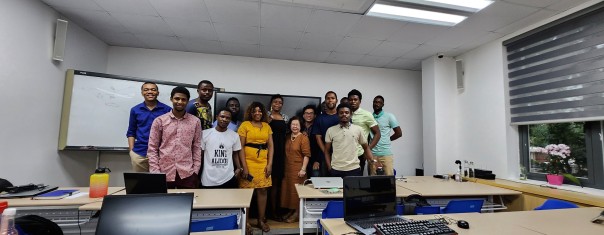Web 3.0 course at Vietnam National University in Hanoi
Description
The ontologies have various origins, from philosophy to knowledge engineering through cognitive sciences. The use of ontologies, or knowledge, is increasingly important in information systems (IS). This course allows the student to deepen the methodological and technical foundations of knowledge engineering based on ontologies. It aims to present the basic concepts of ontological engineering, formalization languages, methodologies for the construction of an ontology and the validation of an ontology, as well as applications based on ontologies such as Generative AI (AI Assistant, ChatGPT…). In addition, this course aims to provide an opening on research in the field of the semantic web.
Content
- General presentation: ontologies and semantic web
- Representation of ontologies: semantic network, conceptual graph, frame language
- Langage XML : parsing, namespace, DTD, XMLSchema
- RDF language: model, syntax, schema, query language
- Description logic: syntax and semantics, reasoning model
- OWL ontology language: syntax, semantics, ontology life cycle
- Rules and logic for the semantic web: DLP, SWRL, …
- Representation languages of ontologies (eg, F-logic, LOOM, KIF, …)
- Storage and query languages for ontologies (eg, RQL, TRIPLE), inference engines
- Semantic web service (eg, OWLS, WSMO, Glue); Research project.
Lecturer:
- Dr. Hoai-Tuong NGUYEN (Titops) <nhtuong@titops.com>
- Lecturer & Director of VNU-IFI NEXT Lab: https://ifi.vnu.edu.vn/vi/news/Nghien-cuu/Next-Lab-943.html
References
- IFI Moodle: http://fad.ifi.edu.vn/ififad/course/view.php?id=33
- Spinning Semantic Web. D. Fensen and J. Hendler (2003)
- A semantic Web Primer , 3rd edition Grigoris Antoniou and Frank van Harmelen (2012).
- Description Logic Handbook, 2nd edition. F. Baader, D. Calvanese, D.L. McGuinness, D. Nardi, P.F. Patel-Schneider (2010)
| Planning |
Week 1Reference documents: |
Week 2 |
Week 3 |
Week 4
|
Week 5 |
Week 6 |
Week 7Reading & summary subject (20% points) :
Mini-project (30% points) :
1 – A report of up to five pages documenting your work: • What you have done 2 – The ontology itself |
